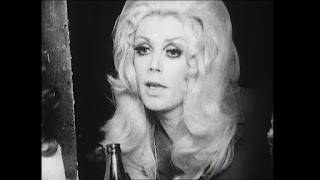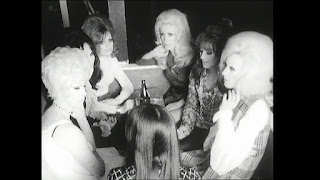Director: Des Monaghan
Release Year: 1971
Release Year: 1971
In 1971, Des Monaghan, an Australian filmmaker, released Transvestites, a groundbreaking documentary that provided an intimate look at the lives of trans women in New Zealand. Filmed during a period of considerable social upheaval, the documentary not only captured the personal stories of these individuals but also reflected the broader struggles of the LGBTQ+ community during a time when gender identity and expression were not widely understood or accepted. Transvestites offered a rare glimpse into the experiences of trans women during the early stages of the modern transgender rights movement, marking a significant moment in the portrayal of transgender people in film and media.
New Zealand, in the early 1970s, was a society that, like many others, was largely conservative regarding matters of gender and sexuality. The concept of "transvestitism" or cross-dressing was often misunderstood, with little to no distinction made between transgender people, transsexuals, or those who simply enjoyed dressing in clothing typically worn by the opposite sex. Gender roles were rigidly enforced, and those who deviated from these norms often faced discrimination, alienation, and isolation. For transgender women in particular, the 1970s were a time of great personal and societal challenge. Public awareness of transgender issues was minimal, and medical treatments for gender dysphoria were still in their infancy. The transgender community was largely invisible in the mainstream media, and those who did come out often faced harsh criticism and misunderstanding. In this context, Transvestites stands out as one of the first documentaries to explore the lives of trans women in a public forum.
The documentary is structured around interviews with several trans women, each of whom shares their personal journey and experience as a trans individual in New Zealand. The subjects in Transvestites offer a range of perspectives, from those who have been living full-time as women to those who still grapple with the challenges of transitioning. Through these intimate interviews, the film provides a detailed look at the emotional, social, and psychological struggles that many trans women face. One of the central themes explored in Transvestites is the tension between the desire to live as women and the societal pressure to conform to male gender roles. Throughout the film, the interviewees reflect on their early experiences with gender identity and how they came to the realization that they were women, despite being born male. For many of the subjects, this realization led them to adopt female clothing and engage in "cross-dressing" as a way to express their authentic selves, even though they had not yet undergone medical treatments or surgeries.
Throughout the documentary, the trans women interviewed discuss how their gender identity has always felt at odds with the male body they were born into. One of the women reflects on the discomfort they felt growing up in a male body and the relief they experienced when they began living as a woman. This dissonance between body and identity is a recurring theme, as the documentary highlights how gender dysphoria – the psychological distress resulting from this incongruence – has shaped the lives of these individuals. Importantly, the documentary shows that, for many of the trans women, their desire to live as women is not a passing phase or a matter of convenience, but a deep and unyielding need to align their outward expression with their true sense of self.
This desire goes beyond simple cross-dressing or impersonation; it is an essential part of their identity, an expression of who they truly are. As one of the interviewees notes, "I've always wanted to be a woman," emphasizing that their transition is not driven by sexual attraction or the desire to emulate women, but by the profound and inherent need to exist authentically in the world as their true selves. The societal reactions to their gender expression are explored in depth in the documentary. In the early 1970s, being a trans woman was not just socially stigmatized but often seen as a form of mental illness. This misconception is touched upon in the film, with a reference to one expert who categorizes transsexualism as a "psychological" disorder. This reflects the broader medical and social understanding of the time, which failed to differentiate between transsexuals and other forms of gender expression, such as transvestitism. One of the speakers in the documentary also notes that many trans women were subjected to psychiatric evaluations and societal scorn, often being misunderstood as mentally ill or criminal.
One of the most significant aspects of the documentary is the discussion of medical transition. At the time, the medical treatments available to transgender individuals were limited, and the process of transitioning was often lengthy and difficult. The interviewees explain how they underwent various forms of medical treatment, including hormone therapy, which helped them develop more feminine characteristics such as breast tissue and softer skin. Some women also pursued facial surgeries, such as nose jobs, to make their appearance more consistent with their gender identity. However, the documentary also highlights the limitations of medical transition in the 1970s. Not all trans women experienced the same physical changes through hormone therapy, and many still felt dissatisfied with their bodies even after undergoing various treatments.
The discussion reveals the challenges faced by trans women who struggled with the mismatch between their inner sense of self and the physical reality of their bodies. For some, the lack of complete physical transformation was a source of frustration and dissatisfaction, as they desired a more feminine body that could fully match their gender identity. The topic of sex reassignment surgery is also addressed in Transvestites. One of the interviewees, Brandy Renee, who is introduced as a trans woman who has had a full sex change operation, explains the process she went through to obtain the surgery. At the time, individuals had to meet stringent medical requirements and psychiatric evaluations before undergoing the procedure, which was not available in New Zealand and had to be sought overseas. Brandy recounts her experience of having to travel to London for the surgery and describes the long and difficult process of preparing for it. This section of the documentary sheds light on the complexities of transitioning during a time when medical technology and social acceptance of trans people were still in their infancy.
Another compelling aspect of Transvestites is the exploration of relationships and romantic partnerships. Throughout the documentary, the trans women discuss how their gender identity influences their personal relationships. Despite the challenges they face in being accepted by society, many of the interviewees report having relationships with men who accept them as women. Some even describe their experiences with male partners who are fully aware of their gender history and continue to love and support them. One of the key insights from these discussions is that trans women are not looking to be treated as sexual objects or to deceive others about their gender identity. Instead, they desire genuine relationships based on love and respect. As one of the women notes, "We live as women, we work as women, and we want to be accepted as women." This underscores the deeply human desire for connection, acceptance, and love that transcends societal labels and misconceptions about gender.
One of the interviewed woman in the film was Niccole Duval. Niccole Duval is a pioneering figure in New Zealand's entertainment scene, best known for her vibrant career in the performing arts. Born in 1944, she grew up in Mount Albert, Auckland, where she first displayed a flair for individuality and performance. Initially, she lived life as a boy, excelling in tennis and school productions, but her interests gradually led her toward the underground world of Auckland’s gay and transgender community in the 1960s. Duval began her career at a young age, performing in strip clubs such as the Pink Pussy Cat and the Windmill Follies. By the time she was 16, she was already performing in drag, and her early performances led to her being nicknamed "Tinkerbelle." Despite facing police harassment and societal prejudice, Duval persisted in pursuing her passion for performance. She was even incarcerated several times for "woman's clothing" and was once wrongfully imprisoned, but these setbacks did not deter her. Her journey took her to places like Hong Kong, where she performed at the Playgirl’s Den, and she later became a significant figure in Wellington’s drag scene, working at Carmen’s International Coffee Lounge.
During this time, she transitioned into living fully as a woman, adopting the name "Niccole Duval" with the help of a lawyer. Duval’s performances were known for their flair and creativity, particularly her work at New Zealand's iconic Mojo’s nightclub, where she was the lead performer, choreographer, and director. Duval continued to shape the entertainment landscape with her shows at Alfie’s, a venue where she became an enduring symbol of New Zealand's gay-friendly nightlife. Her performances were legendary, blending bold visuals, music, and humor to create unforgettable experiences for her audiences. Beyond her career on stage, Duval also made significant contributions to the visibility and acceptance of transgender individuals in New Zealand, becoming a role model for many within the LGBTQ+ community. Throughout her life, Duval has proven to be a trailblazer, navigating both personal and societal challenges with grace and resilience. Her legacy as a performer and advocate for the transgender community continues to inspire.
Ultimately, Transvestites represents a significant cultural moment in the early 1970s, capturing a time when society was beginning to question rigid gender norms and the medical community was starting to develop a deeper understanding of gender dysphoria. The documentary provides valuable insight into the lives of trans women during a time of profound societal change, and while many of the issues they face are still relevant today, the film serves as a historical document that shows how far we have come in terms of understanding and accepting transgender identities. The documentary’s candid portrayal of trans women, their struggles, and their resilience offers a rare and important perspective on the transgender experience. By giving voice to those who had been marginalized and silenced, Transvestites helped to open up conversations about gender identity that were long overdue. Although the social and medical landscape has evolved significantly since the documentary’s release, Transvestites remains an important record of the transgender experience in the 1970s and serves as a testament to the strength and courage of those who lived through it.
via: youtube and nzherald.co.nz
Image credits: YouTube











No comments:
Post a Comment